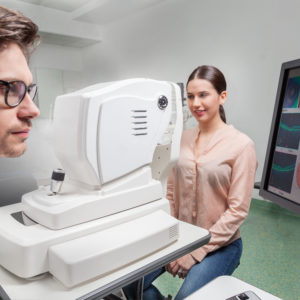Optometry is an ever-evolving field. One of the major forces behind this advancement is vision science research. There are many advantages to pursuing a dual OD/MS degree during Optometry school. Here is list of which programs are offered at the different optometry schools. 
First, it will broaden your skill set and provide the opportunity to explore your interests. Furthermore, it can be beneficial when applying for a residency, or a teaching position. Though the OD and MS programs complement each other nicely, they have their differences.
Aside from the thesis research aspect, the vision science program’s classes themselves are more research based. These classes tend to delve deeper into certain topics discussed in the OD curriculum. For these reasons, the interview for a dual OD/MS program differs from an OD interview and require distinct preparation. Here are a few pointers to think about as you prepare for the OD/MS interview.
Figure Out Your “Why”
As with any position or application, think about why you want to pursue the dual degree. What inspires you? What interests you? Using these questions as a framework can help you think about how the OD/MS will further your career goals. Additionally, faculty advisers can help you learn about the benefits of the program. Likewise, professors who have completed dual degrees can tell you how they feel it impacted their careers. Gathering this information will show how you’ve thought out the decision to pursue the dual degree.
Demonstrate Your Time Management
Optometry school is quite busy, adding on an MS degree is going to take some extra time out of your week, but it is manageable (time management tips). Talking to current OD/MS students will help you get a feel for the time commitment. Then, you can see realistically how it fits into your schedule. To further demonstrate that you can manage the extra courses, you can discuss how you’ve managed to balance optometry school with extra-curricular activities. Also draw examples from your undergraduate degree; if you’ve done research in the past, discuss how you were able to balance your research and academics.
Research Your… Research
Be fluent in your research experience! I found it helpful to skim some of my previous research presentations to re-familiarize myself with the details. It is also important to discuss experiences presenting your research, whether at conferences or in classes. If you’re new to research, no worries!

Alternatively, discuss experience with scientific writing, presenting, or reading literature and writing research papers. It’s a good idea to discuss your ideas with current professors involved in the OD/MS program, they can help guide you to which faculty members may share your interests.
If you are going to go this route, do a bit of extra background research to learn about the topic, and what kind of studies are being done. The point of this is not to decide on exactly what you want to study, but to demonstrate that you can think through the process.
Discuss your relevant skills
There are a great number of skills and experiences that you bring to the OD/MS, make sure you talk about them during your interview! Depending on what area interests you, the specific research skills required may differ. However, there are some important foundations that relate to all research projects.
No matter what your focus is, keep up with reading scientific literature, scientific writing, and presenting. You may have experience with some of these, even if you are new to research. Additional experience with software like Excel, statistical software, or even reference managing software can also be an asset.
These are just a few tips to help you in preparing for the MS interview, as it may differ from the OD interview. The OD/MS degree is challenging, but I truly believe it will help you in your career, both in the knowledge you gain, and in learning to think critically.
Research requires you to look at things a different way, it entails innovation and creativity; don’t be afraid to challenge yourself. One of my favorite quotes regarding research was originally attributed to a German philosopher who said “Research is to see what everyone else has seen, and think what nobody else has thought”.

